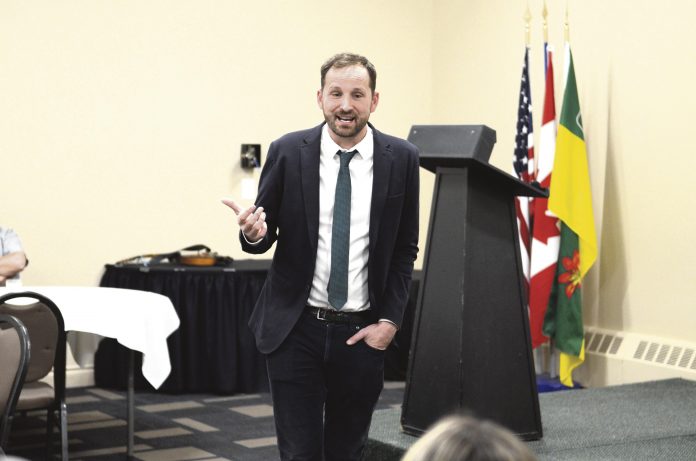
NDP leader Ryan Meili questioned the Saskatchewan Party’s commitment to reducing the impacts of climate change during a stop in Prince Albert Friday.
Meili visited the Prince Albert Daily Herald office during a day of meetings in the city.
He responded to how this year’s provincial budget reduced the climate change budget by about 14 per cent.
“Cutting back on that entirely shows a lack of understanding,” he said.
Explanations given to reporters on budget day ranged from a reduction in administrative costs to a revised estimate of what current programs are costing the government.
Finance Minister Donna Harpauer, in a pre-budget media briefing, emphasized that no programs were affected by the funding cut.
Speaking to reporters post-budget, Environment Minister Dustin Duncan explained the change was because the department came in under budget last year.
“In the past number of years we’ve come under budget when it comes to the Climate Change branch. This year’s budget more accurately reflects the dollars we’ve spent in the last couple of years, and I would also say we’ve reduced some contracts within the ministry that we’ve had in the past,” Duncan said.
The funding had been allocated to Climate Change and Adaptation, an area of the budget used to develop policy and regulatory frameworks to mitigate the effects of climate change. That includes regulation of greenhouse gas emissions. The province is currently developing its climate change plan.
“We know the work plan and the consultations and the amount of work it’s going to take to develop the Prairie Resilience Plan this year,” Duncan said. “We just had a better idea of the dollar amount we’re going to need.”
The province also committed to not implementing a carbon tax. Such a policy would hurt the economy, including the livelihoods of farmers. Farms and forested areas act as a carbon sink, sequestering polluters’’ outputs, the government says.
Unlike other sections of the budget, there was no press release or background explainer for the province’s environmental funding and policies. However, going through the estimated spending allocations line-by-line, it becomes clear where the funding is, and isn’t heading.
According to the Daily Herald’s look at the environment budget, funding reductions come from executive management and central services in the Ministry of Environment in general.
Under the climate change envelope, funding was reduced under the “cumulative impacts and science” line. Funding is also estimated to be down in the Fish, Wildlife and Lands program, mostly due to a reduction in salary. Less money is also being directed to forest programs, as well as the reforestation fund.
But as Minister Duncan explained, the money cut from the reforestation fund is actually a good sign.
Beginning in the late 1980’s it was basically the taxpayers that paid when a tree was harvested. We paid to plant a new one,” Duncan explained to Global News.
“Over the course of the last 20 years, the government has been slowly removing our obligation where last year was the last of the trees that we would need to plant.”
Instead, companies working in the forestry industry are responsible for replanting as trees are harvested. One tree must be planted for each tree cut down.
The budget did include more funding for parks, although it’s not clear whether more efforts will be undertaken to protect provincial land or conserve endangered species, such as the boreal caribou. Advocacy groups such as the Canadian Parks and Wilderness Society Saskatchewan have been advocating for a greater percentage of protected land in the province.
For the NDP the reduction in the budget for the Ministry of Environment is a sign the province isn’t taking climate change seriously.
“The challenge of climate change is something that everybody is starting to recognize as real, farmers, farming communities and northern communities,” Meili said.
“This is affecting people. This is a time where we should be looking at where we can invest to slow down emissions and help people be ready to adapt and mitigate the changes that come with climate change.”
— With files from D.C. Fraser, Regina Leader-Post

